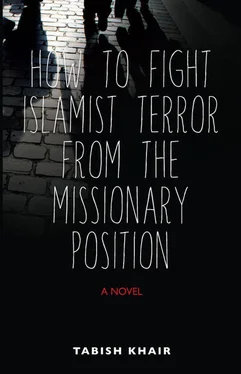Ravi was not entirely wrong. When I disclosed Ravi’s prank to Ms. Marx—I put it in the light of a practical joke played by him and she never conceded that it might have influenced her to start dating me—a shadow of irritation crossed her face. Two small vertical creases appeared between her eyebrows; I now know that they are a sign of anger. But then she laughed. And she agreed to see me again.
For the first time in my years in Denmark, I heard the sounds of domestic strife as I walked up the stairs that night. The evidence I had seen all around me—even the statistics of a nearly 50 percent divorce rate, which, Ravi perversely claimed, was slightly less disturbing than the statistics of a one percent divorce rate in India. But I had never heard the sounds of domestic strife. Not in Denmark.
The sounds came from the twin-flat of Great Claus and Pernille. First, a torrent of high-pitched Danish words (which I did not understand) from Pernille. Then a great booming “nej, nej, nej, jeg har sagt nej”—no, no, no, I have said no—from Claus, which was rudimentary and loud enough for me to understand. Then china or glass being smashed on the floor, a language that needs no interpretation across cultures. The slamming of a door. And then that loudest of noises: silence.
Ravi had spent the 1st of May trying to find a single public event or protest in the city that was, in his words, worthy of the occasion. It was an annual ritual with him. As usual, he had failed.
But this year, he took the disappointment quite well. He did not talk about how Denmark was the only modern country that never had and never would have a revolution, or try to explain why this peculiar quirk of Danish history could be traced to the mid-nineteenth century founding of the Tivoli Entertainment Park, for the distraction of the people, in Copenhagen. He even ignored the usual rhetoric put forth by the usual Danish politicians calling for the abolishment of Labor Day and its replacement by the Queen’s Birthday as a “truly Danish event.”
I had noticed this in recent weeks: his love for Lena had made him less critical, or at least more forgiving. It made me overcome the irritation that I felt at times at Ravi’s tolerance of Karim Bhai’s more Islamic habits. Ravi, despite all his cracks, was someone who put people first. In those days, not uninfluenced by a lecture I had written on Swift, I saw in Ravi the shade of that caustic Irish writer who, in response to his critics, had claimed he did not hate humankind—because, unlike his critics, he was never surprised by human failings. Perhaps I was wrong in that too. Perhaps Ravi expected more from humankind than Swift. I am certain he expected more from Lena.
One morning, late in May, Karim Bhai turned to us over breakfast, with his dark-edged baby-eyes, and said, “Will both of you be here on Saturday afternoon next week? Ajsa wants to drop in and pick up her things.”
Ajsa still had a few boxes and books stored away in the flat. It looked like she had finally found space for them in the place she shared with Ibrahim.
Ravi was going to be away for the weekend with Lena. He said so.
“Are you working on Saturday, Karim Bhai?” he asked.
“No, actually, I am not,” replied Karim.
“Then you won’t need us,” said Ravi. “She just has some odds and ends. You will manage between the two of you.”
Ravi, despite his interest in Karim’s faith, could be surprisingly blind at times to its intensity and rigidity. I knew by now that Karim Bhai wanted one of us around because he would not allow himself to be alone in a flat with a woman he was not married to and who was not related to him by blood.
I agreed to stay and help them move Ajsa’s stuff. Karim looked relieved. His chastity was no longer under threat by the dangerous and decadent sex, I supposed.
Ajsa was thinner than I remembered her. The crow’s feet around her eyes, the slightly cavernous look on her face, accentuated her surprising leanness. Was it because the weather had removed some extra layers of clothes from her, from all of us? Or had she lost weight over the past few weeks?
Ibrahim did not come with her. He is out with Ali, she said, and shook her head. It was tightly wrapped in a black-and-white Palestinian scarf, her blonde hair almost invisible. Karim nodded, as if he understood. Later, I thought about that nod. I mentioned it to the police. The officer nodded too, as he jotted it down.
Ajsa declined to stay for a cup of tea. It took us less than five minutes to cart her boxes and belongings, some stored in the basement that we shared with all the residents, to the old blue Peugeot that she had borrowed from someone.
We had already been out as couples with Ms. Marx and Lena—once to a café and once to a French film in Øst for Paradis, the alternative theater in town. “You can tell it is alternative because you hardly ever see any Dane under fifty here,” Ravi had quipped.
Now Ravi talked all of us into visiting Lena’s parents for a weekend. Lena’s parents lived in a village off Aalborg—very picture postcard, Ravi promised us—where they worked. It was just an hour’s drive.
Ms. Marx had trouble fitting it into her schedule. Her son was going to his father only on Saturday afternoon. She could not leave before that. Finally, we decided to go first—Lena, Ravi and I—by bus. Ms. Marx would join us for dinner on Saturday night—she had a car—and I would return with her on Sunday afternoon. Ravi intended to stay on for a couple of days with Lena and explore, what he termed, her childhood shrubberies.
As usual, we asked Karim Bhai to drop us at the bus stop. Like most of our neighbors, we had got used to hiring his cab in the black. He always refused to let us pay, but then finally accepted a sum that was, as a rule, a bit less than his usual fare would have been.
That day, however, he refused to let us pay, perhaps because Lena was with us. Was it courtesy? Or was he just being careful with a Dane he did not know and who could inform on him?
Allah-hafiz, said Karim Bhai to us at the bus stop. Go in the care of God.
Allah-hafiz, Ravi responded.
Waiting for the bus, I took him to task. Lena looked on, bemused.
“Why the fuck do you have to say Allah-hafiz, Ravi?” I asked him.
“Why not, bastard? I say namaste, I say goddag, I say Merry Christmas…”
“It’s not that. I remember you used to say khuda-hafiz. I distinctly recall you khuda-hafizing my parents with a vengeance when they visited three years ago.”
“That was before Karim Bhai. He says Allah-hafiz.”
“That is my point, you wannabe fundu! It was always khuda-hafiz in India and Pakistan: go with God, go in the care of Khuda, the Persian word for God. Now these woolly Wahabbis are trying to get all Arabic, and they insist on using Allah, the Arabic word…”
“Hardly an issue for me, bastard.”
Lena did not know whether to smile or not. She never really understood the tone of our conversations around such issues: our disagreements and agreements were too uncertain and disorderly for her way of thinking.
“Yes, it is, you ignorant kafir. See, Allah-hafiz already existed as a phrase in Urdu. If you said Allah-hafiz, it was a dismissive gesture. Like ‘Only God can put some sense in him now.’ So these fucking fundus are messing up my bloody language, their own bloody language. It is a matter of historical and linguistic accuracy: Allah-hafiz does not mean the same as khuda-hafiz in Urdu, whatever it might mean in fucking Arabic.”
Ravi mulled over the problem.
“Point noted,” he said. Lena looked just a bit relieved; she took our arguments more seriously than we did. In general, like all the Danes I had met, she hated conflict of any kind. Revolution was not the only thing Tivoli had subverted, or so Ravi might have quipped once upon a time.
Читать дальше












